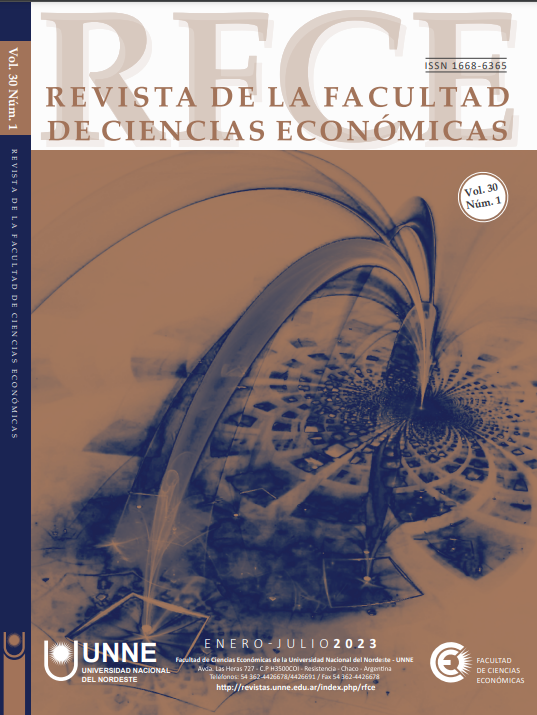The observation instrument before the expert panel
DOI:
https://doi.org/10.30972/rfce.3016691Keywords:
Content validity, Fleiss kappa, Degree of agreement, Psychometric studyAbstract
Cryptographic security blockchain brings to accounting, the reliability of distributed recording and it is presumed that it could generate significant changes in accounting practice in the face of the widespread opinion that the move to triple entry would entail. The bibliographic survey showed the benefits attributed to this technology, its experimental nature, the expectations generated in the accounting discipline and the lack of scientific instruments. The aim of this article is to carry out, on the basis of expert judgement and statistical techniques, the process of validating the content of the observation instrument. The research follows a classical structure of theoretical-empirical analysis. The methodological choices include a non-experimental, descriptive, cross-sectional, qualitative-quantitative and prospective design that collects data by means of a survey. Expert judgement is a widespread external evaluation practice that weights the representativeness of the instrument's items. The degree of agreement was determined by Fleiss' kappa coefficient. The validation process of the interview document achieved consensus among the evaluators regarding the validity of its content for producing information on blockchain, cryptocurrencies and accounting information; however, the evidence should be admitted with caution given the non-probabilistic selection of the sample. The narrow values of the evidence are attributed to the emerging nature of the topics addressed, however, they exceed the threshold of agreement required of the expert panel, having verified the criteria of clarity, coherence, relevance and sufficiency, used to evaluate the interview document.
References
Argañaraz, A., Mazzuchelli, A., Albanese, D. y López, M. A. (2019, 12 de diciembre). Blockchain: un nuevo desafío para la contabilidad y auditoría [ponencia]. Trabajo presentado en XV Simposio Regional de Investigación Contable y XXV Encuentro Nacional de Investigadores Universitarios del Área Contable. https://backend.congresos.unlp.edu.ar/index.php/encuentro-simposio-fce/article/view/777/207
Benjamin, D. J., Berger, J. O., Johannesson, M., Nosek, B. A., Wagenmakers, E. J., Berk, R., Bollen, K. A., Brembs, B., Brown, L., Camerer, C., Cesarini, D., Chambers, C. D., Clyde, M., Cook, T. D., De Boeck, P., Dienes, Z., Dreber, A., Easwaran, K., Efferson, C., Johnson, V. E. (2018). Redefine statistical significance. Nature Human Behaviour, 2(1), 6-10. https://doi.org/10.1038/s41562-017-0189-z
De Castro, I. G. y D’Andrea, N. A. (2021, 2 de diciembre). Cadena de bloques. Su vinculación con la contabilidad [ponencia]. Trabajo presentado en 17° Simposio de Investigación Contable, Buenos Aires. http://sedici.unlp.edu.ar/handle/10915/132212
Deloitte Deutschland. (2016). Blockchain Technology. A game-changer in accounting? https://url24.top/ezBrE
Escobar-Pérez, J. y Cuervo-Martínez, A. (2008). Validez de contenido y juicio de expertos: una aproximación a su utilización. Avances en Medición, 6, 27–36.
Fleiss, J. L., Levin, B., & Paik, M. C. (2003). Statistical methods for rates and proportions (3rd. ed.). Wiley.
George, D., & Mallery, P. (2020). IBM SPSS Statistics 26 Step by Step (16th ed.). Routledge.
Gwet, K. L. (2014). Handbook of Inter-Rater Reliability (4th ed.). Advanced Analytics.
Landis, J. R., & Koch, G. G. (1977). The measurement of observer agreement for categorical data. Biometrics, 33, 159-174.
Martínez Gómez, J. A., Guerrero Rodríguez, S. I. y Rey Anacona. C. A. (2012). Evaluación de la validez de constructo y la contabilidad del inventario de masculinidad y femineidad en adolescentes y adultos jóvenes colombianos. Avances en Psicología Latinoamericana, 30(1), 170–181.
Nunnally, J. (1967). Psychometric Theory. McGraw-Hill.
Pedreño, E. P. (2019). La tecnología blockchain y su aplicación a la contabilidad (y II). CONT4BL3. Núm. LXX, 15-23. Asociación Profesional de Expertos Contables y Tributarios de España (AECE). https://www.aece.es/descargararchivo_docnoticias_2007
Pedrosa, I., Suarez Álvarez, J. y García Cueto, E. (2013). Evidencias sobre la Validez de Contenido: Avances Teóricos y Métodos para su Estimación. Acción Psicológica, 10(2), 3–18.
Pérez Gil, J. A., Chacón Moscoso, S. y Moreno Rodríguez, R. (2000). Validez de constructo: el uso de análisis factorial exploratorio-confirmatorio para obtener evidencias de validez. Psicothema, 12(2), 442–446.
Scott, W. (1955). Reliability of content analysis: The case of nominal scale coding. Public Opinion Quarterly, 19(3), 321-325.
Utkin, L. V. (2006). A method for processing the unreliable expert judgments about parameters of probability distributions. European Journal of Operational Research. 175(1), 385-398.
Downloads
Published
How to Cite
Issue
Section
License
La Revista de la Facultad de Ciencias Económicas solicita sin excepción a los autores una declaración de originalidad de sus trabajos, esperando de este modo su adhesión a normas básicas de ética del trabajo intelectual.
La Revista de la Facultad de Ciencias Económicas de la Universidad Nacional del Nordeste, Argentina, declara e informa que no se aplica a los autores ningún cargo ni costo, por la publicación de los artículos. La distribución y acceso, son de carácter libre y gratuito.
Este obra está bajo una licencia una licencia de Creative Commons Reconocimiento-NoComercial-SinObraDerivada 4.0 Internacional.





